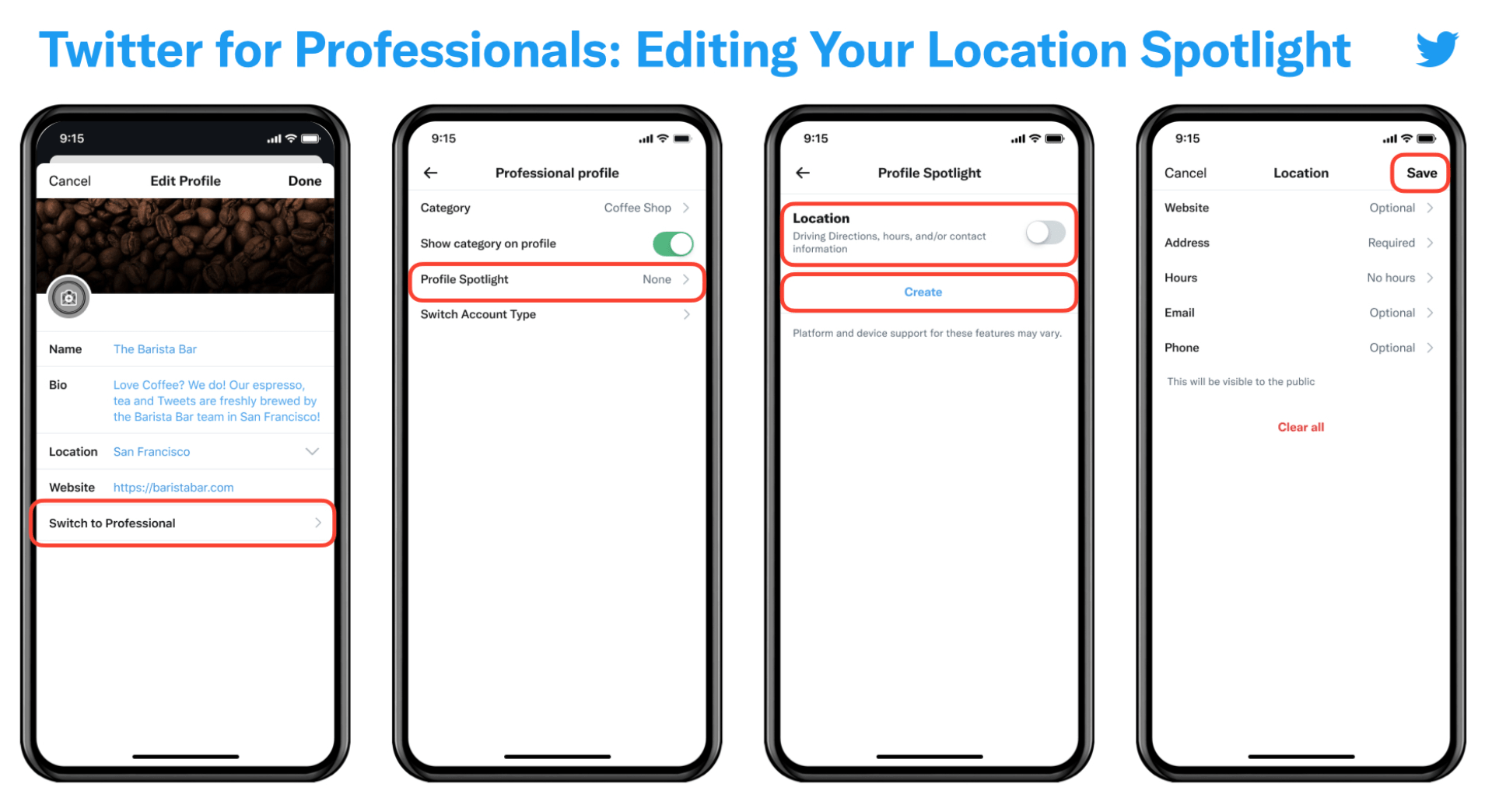Local Memo: Twitter’s Listings-Like Location Spotlight
In this week’s update, learn about Twitter’s listings-like Location Spotlight; Google’s new attribute for Asian-owned businesses; a help doc update regarding Google Posts; the shutdown of Live Shopping on Facebook; a guide to GBP conversion factors; and Yelp’s new discovery-based interface.
Twitter’s Listings-Like Location Spotlight
Twitter has rolled out its new Location Spotlight feature globally for brands and businesses with Professional Accounts. Previously, the feature had been tested with select accounts in the U.S., U.K., Canada, and Australia. Location Spotlight lets businesses add listing-like information to their Twitter profiles including address, contact information, and hours of operation. Most Twitter accounts only permit a short description and a URL in profiles. Users can also indicate their location by city and state but not by address.
The move comes as Twitter is trying to find ways to help businesses market themselves on the platform. The addition of specific location information in profiles, for example, makes it possible for local businesses to entice customers to stores; clicking the address in the business’s Twitter profile will launch your phone’s default mapping app. In addition to Location Spotlight, some Professional Accounts also have access to Shop Spotlight, which allows them to showcase available products in a carousel display.
Courtesy Twitter
Google Adds Asian-Owned to List of Identity Attributes
Google has added “Identifies as Asian-owned” to its list of so-called identity attributes, which are configurable by business owners and managers in the Google Business Profiles interface and API. The new attribute joins several others in a list Google has augmented over the last couple of years, including women-owned, veteran-owned, Black-owned, Latino-owned, and LGBTQ+ owned. Businesses that enable the Asian-owned attribute will see a new icon appear in their business profiles. Presumably, the attribute will act as a de facto search filter as well, making businesses that enable it more likely to appear in searches that include the phrase “Asian-owned.” This has been true to date for other identity attributes.
Google has also announced expanded support for the US Pan Asian American Chamber of Commerce (USPAACC), with a new initiative designed to help 10,000 Asian-owned businesses gain skills in promoting themselves digitally.
Courtesy Google
Google Help Doc Forbids Duplicate Posts
Google has updated its lengthy help page that details the company’s content policy for Google posts. A new bullet point has been added to the list of content types that Google considers to be spam. In addition to misspellings, blurry images, links to malware, and other examples of disallowed content, Google has added: “Duplicate photos, posts, videos, and logos.”
Discussion of this update on the Local Search Forum suggests that many local SEOs are unsure of what the language means. Are duplicate photos, videos, and logos allowed on multiple Google profiles, but not allowed within a single profile? Can a business use the same post content at different times? What does “duplicate logos” mean? Are the rules different for SMBs than for multi-location businesses? These answers are important, given that Google often removes posts that violate its guidelines. I’ve reached out to Google for clarification and will report back what I hear.
Facebook Discontinues Live Shopping
Meta is shutting down Live Shopping events on Facebook in a bid to promote short-form video over other formats. The company announced that native livestream shopping will no longer be supported as of October 1, 2022. Facebook Live is not going away, but Live users will no longer have the ability to create product playlists or tag products in videos. Live Shopping on Instagram, where the offering has been more popular, will continue to be available, but Meta is encouraging users to experiment with short-form video for shopping via Reels and Reels Ads on both platforms.
A Guide to GBP Conversion Factors
A new post on the Bright Local blog offers a deep dive into GBP conversion factors. The notion of local conversion factors was first introduced by Darren Shaw back in the 2020 edition of Local Search Ranking Factors, as a way to capture the notion that some features in a Google profile, though they may not help the profile rank more highly in search, can still help to ensure that consumers encountering your profile will choose it over the competition.
Conversion factors discussed in the post include ratings and reviews, review response, and recency of reviews. Other factors include profile completeness — with a particular focus on business name, hours of operation, phone number, and website link — as well as website content, products and services, business descriptions, photos, justifications, and several others. The post explains the importance of each factor and offers tips for optimizing your profile to increase the chances of conversion.
Yelp Brings Discovery Interface to Android
Last year, Yelp launched a new look and feel for its mobile app, placing a big emphasis on restaurant discovery and making more prominent use of photos on the main page. That update was previously only available on iOS, but is now rolling out to Android phones. The new interface looks more like a social media feed than a typical search-oriented app, featuring popular dishes and other trending photos uploaded by users. The update also makes the map more prominent in the Yelp app, which, like the photo-oriented feed, has the general effect of making the app more visually oriented.
Courtesy Yelp
Damian Rollison
Subscribe to Local Memo!
Signup to receive Local memo updates and the latest on localized marketing, delivered weekly to your inbox.


